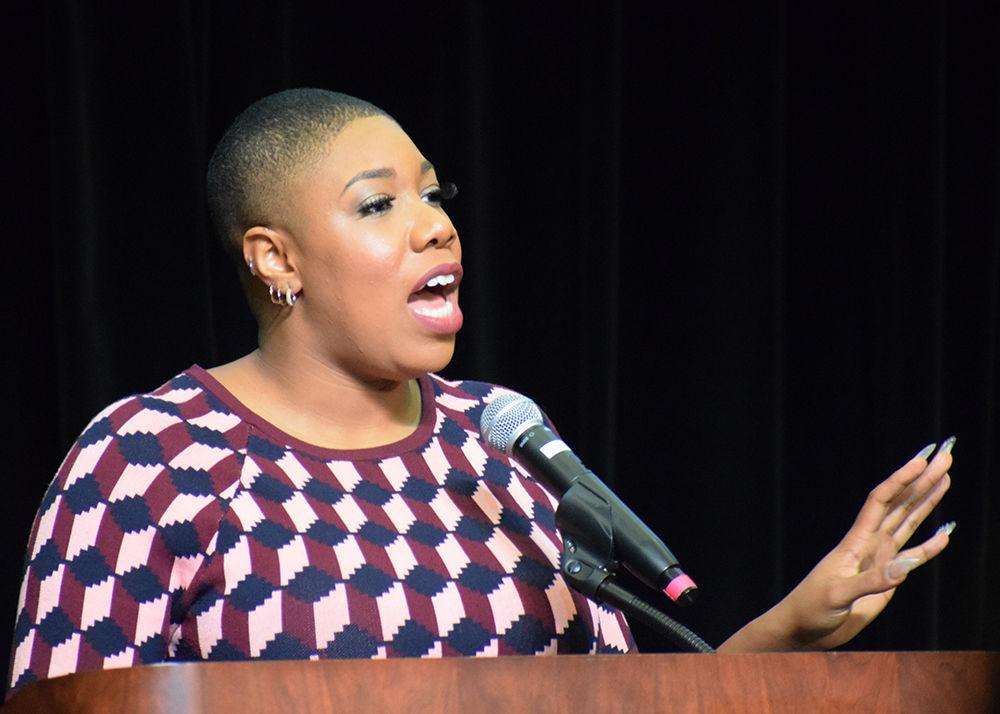The 2019 Martin Luther King Jr. campus commemoration speaker was Symone Sanders. At only 25 years old, Sanders was the press secretary for Bernie Sanders’ 2016 presidential campaign and earned a spot on Rolling Stone magazine’s list of 16 young Americans shaping the 2016 election. On Jan. 17, Sanders presented her speech, “MLK: The Realist,” to encourage listeners to follow the example of Martin Luther King Jr. in the modern fight for equality.
John Miller IV, program coordinator for the African American Cultural Center, helped organize the event.
“This is our annual MLK commemoration speech, so we are excited to have Symone Sanders, who is a phenomenal commentator, who does all of the things and just exudes black girl magic,” Miller said. “It really is just an opportunity to revisit the teachings that MLK has taught us, has taught the world, has really demonstrated.”
Moses T. Alexander Greene, the director of the African American Cultural Center, opened the event and introduced Sachelle M. Ford, the assistant director of the AACC. The speech was preceded by introductions from Ford and Randy Woodson, the Chancellor of NC State.
“I’m so excited to be here because I have seen the intellect of today’s speaker many times on CNN, and I know many of you have as well,” Woodson said. “… She continues this day to be a professional communicator, to bring issues that are prominent to society in this tumultuous time to the floor in a very articulate and passionate way. Also, she brings a skill, not only in communication, but in bringing people together and working through the political process as a political strategist to help many across this country envision what American should be.”
Sanders’ speech focused on the unfiltered, radical version of Martin Luther King Jr.
“So in the spirit of the Rev. Dr. Martin Luther King Jr., I don’t want us to talk about having a dream, because we talk about the legacy of Dr. King in a very sanitized manner,” Sanders said. “We don’t talk about how they called him a terrorist, and that they said Dr. King was an enemy of the state. They said he was a traitor, and how dare he speak out against the government and the people who gave him his freedom.”
Miller commented on the importance of Sanders’ topic.
“Oftentimes the construct of MLK is that was he very peacekeeping and peace loving, which he was, but he was also very radical, especially towards the last few months of his life leading up to his death,” Miller said. “So this is really about him being the realist, him being the radical, him pushing us and prodding, and changing us to do more for the world.”
According to Sanders, to live like Martin Luther King Jr., one must be a “radical revolutionary” by standing for justice in everyday situations.
“Time after time after time in our history, people are willing to come together and stand up against the extreme treatment, but very few people are willing to attack the underlying issue,” Sanders said. “Sometimes being a radical revolutionary isn’t necessarily about jump-starting a movement, a bus boycott. Sometimes being a radical revolutionary and bumping the status quo is about speaking up in that board meeting.”
Sanders highlighted the significance of working for equality today.
“The work that we are doing right now, the work that is happening on this campus, is the work that will color the lives that people live, the students that will attend this university 50-60 years from now,” Sanders said. “Much like the work Dr. King did 60 years ago literally colors the lives we live today.”
Finally, Sanders brought a modern take on Martin Luther King Jr.’s work.
“Before Dr. King died, he was talking about economic inequality, a poor people’s campaign, and today the gap between the richest people in this country and the poorest people in this country is the largest it has ever been, and the gap between black people and white people is a chasm,” Sanders said. “The work we are doing right now is literally the lifesaving work for generations to come. We have be willing to get uncomfortable. We have to be willing to do the things that haven’t been done before.”
More information about Symone Sanders can be found on her website.













